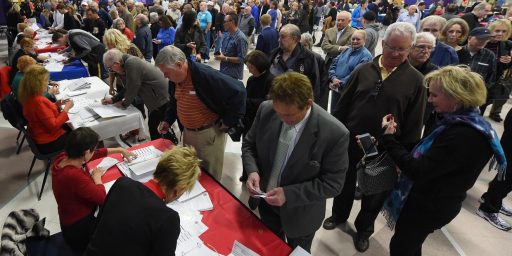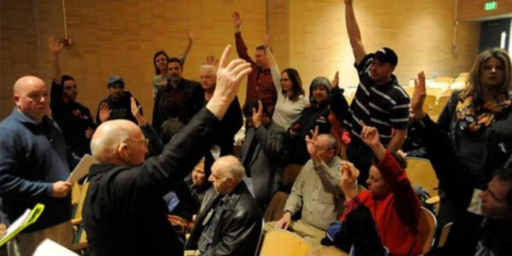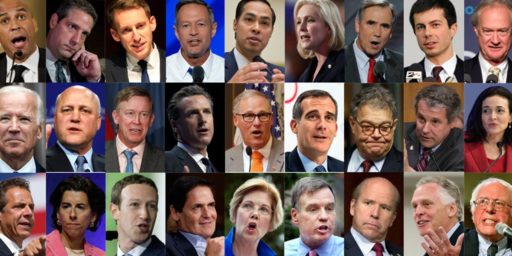Popular Vote Silliness
Mark Blumenthal examines the ongoing argument as to which of the Democrats have the most popular votes. In addition to the traditional counting issues, he notes that a bigger problem is that the very notion fails to meet the test of “concept validity.”
That’s a wonky term that simply means that before measuring something we ought to define clearly what it is we are trying to measure.
[…]
Clinton supporter Gov. Ed Rendell, D-Pa., for example, has condemned caucuses as “undemocratic.” Appearing on “Meet the Press,” he argued that in caucuses, “older people can’t vote, older people who vote by absentee ballot… if you’re a shift worker and a lot of our workers, because they’re low-income workers, are shift workers, you can’t vote in a caucus.”
Obama supporters, on the other hand, point to a paper by author Glenn Hurowitz and business school professor Gregory Nini asserting that a popular vote tally “dramatically devalues the popular will” of voters living in caucus states precisely because of the much lower turnout in caucuses. The 13 caucus states (which Obama won by an average margin of 35 percentage points) represent 15 percent of eligible voters and 14 percent of Democratic delegates, but only 2 percent of the popular vote cast. Had the caucus states held primaries, Hurowitz and Nini argue, Obama’s victory margins would have been diminished, but his raw popular vote tally would be significantly increased because of much higher turnouts.
It goes beyond that.
- In the early states, where other candidates drew significant numbers of votes, merely counting the number who voted for the two who remain standing is invalid unless we presume that those votes would have been equally divided between Clinton and Obama. Those who would have preferred, say, John Edwards but would rather have Obama than Clinton are retroactively disenfranchised in this process. (In the actual delegate contest, though, they’re actually more influential than those in later states, since they help shape the race to come.)
- Additionally, it’s quite likely that many of those who voted for Clinton or Obama in January or February, when much less information was known, would prefer the other candidate if allowed to vote this past Tuesday when the residents of Pennsylvania did.
- Some states had elections on Saturdays; others, during the week. This impacts different people in different ways but certainly influenced turnout and vote margins.
I’m sure readers can come up with other points along these lines. The bottom line is that, unless there is a single election, held at a single point of time, pitting the exact slate of candidates against one another and employing the same counting rules, any reference to a “popular vote” is meaningless.
This doesn’t mean, of course, that the candidate trailing in the delegate count can’t trot it out to see if it sways the superdelegates.






Hillary Clinton is a LIAR!!! She lied about the SNIPER FIRE. SHE IS LYING ABOUT THE POPULAR VOTE!!! SHE IS A LIAR!!!!!
What’s your point?
I just love it when those on the left discover the truth about their heros and former hero’s. Wait till you know the truth about B. Hussein Obama. If he had not been running, Hillary would be the nominee. Funny thing is, it is the same Hillary you would be trying to foist upon us as a good choice for President. Point well taken James.
I am absolutely persuaded by this post that the Dems’ system for choosing their presidential nominee is profoundly flawed, and that their current problems cannot be surmounted by anything approaching a fair solution — meaning that an unfair solution will be applied that will leave a substantial portion of the Democratic Party’s members (perhaps a fifth to a quarter) extremely dissatisfied.
What I’m waiting for, Dr. Joyner — and perhaps you have some intuition about this which you will share — is the explanation for why this is all the fault of George W. Bush and Dick Cheney. (Perhaps, also, Justices Scalia and Thomas.)
Not sure I can concoct one for that. Probably some Kos diarist has already done so, though.
The whole world knows she lies. what’s the hoopla
all about. This is nothing new. She accepted the lies by Bill. Why is she trying to portray herself as a bastion of truth at this late date.
JLA